Completed activities
Ongoing activities
Pending ideas
The IAM4NFDI Incubator aims to develop, foster and mature new ideas in the field of identity and access management. The incubator will investigate new technologies that currently have no place (yet) in the services ecosystem of the IAM4NFDI project. This may include to test and experiment with potential new features for existing CAAI solutions. You can find more information about IAM4NFDI in our documentation.
The incubator runs six sprints per Incubator. These incubators typically take about 6 months and employ an agile methodology to enable rapid development of ideas. Preferably at least two subject matter experts work together with support from the project team. Subject matter experts are recruited from within the team. In addition, the project team facilitates the incubator track by providing a scrum master and dedicated developers. During the incubator project there is regular exchange between the project team and the selected CAAI solution. At regular intervals the project members will give a short update on the current state within a sprint demo meeting.
The Main Incubator Board (MIB) aims to represent a broad view on all developments in identity and access management within the different NFDI consortia. MIB members are project members of IAM4NFDI, experts from the different CAAI solutions and service stewards from BASE4NFDI. They evaluate new ideas and provide advice to the work package lead. They are also responsible for reviewing activities at the end of each incubator cycle and providing recommendations on how to proceed. The incubator team presents their results regularly to the the MIB's and the wider community. In the middle and at the end of a cycle there are two events public events, so called sprint demos.
The service task operates and maintains the T&I services in the GÉANT project. The incubator works closely with the responsible service owner on activities that have an impact on an existing service. They are already involved in the selection of new activities to ensure that the topic is appropriately supported. Once the activity is completed, all results are handed over to the service owner, who will take care of further development.
Some of the Incubator's outputs are not handed over to a specific party, but are made available to the wider community. These are, for example, the results of studies and research that are published or software that is publicly released as open source. All results are publicly available and announced via the project's news channels to inform as many community members as possible.
In addition to the general R&E community, the Incubator sometimes works with external partners. These can be other communities, projects or groups that develop software products or provide services. Examples are institutions, individual NRENS or groups such as the Shibboleth Consortium.
01 Aug 2023 - 31 Jan 2024
01 Feb 2024 - 31 Jul 2024
01 Aug 2024 - 31 Jan 2025
01 Feb 2025 - 31 Jul 2025
01 Aug 2025 - 31 Jan 2026
01 Feb 2026 - 31 Jul 2026
01 Aug 2026 - 31 Jan 2027
The Incubator accepts proposals from all NFDI consortia as long as they are suitable to improve the identity and access management within NFDI. All kinds of innovative ideas are welcome, regardless of whether they are about new products, improving existing services or even completely disruptive. The format for submitting a proposal is designed to be as simple as possible. There is a "Call for Ideas" where anyone can submit their ideas. All you have to do is fill out the template and describe your own idea. New ideas can be submitted at any time, but there is a deadline before each cycle so that they can be considered for the next cycle.
Incubator Process Incubator Proposal TemplateActivities

AAI service integration into LARA
LARA is an AI driven, next generation open-source Research Data Management / LIMS / ELN System. It supports natural scientist of all disciplines to generate highly interlinked, semantically annotated data and metadata knowledge graphs. With its lab-automation capabilities it can capture semantically annotated (measurement) data from the moment of creation. (Local) AI systems assist to structure the research data and build a query-able knowledge graph, making them as FAIR as possible. Experimental results can be seamlessly synchronised with different project partners or public repositories (like NFDI dataverses, e.g. NFDI4Cat, Zenodo, EOSC cloud).
This project shall develop a generic django-allauth (https://github.com/pennersr/django-allauth) based plugin to grant the NFDI community access to a LARA service.
Goals
- Develop a generic python-django allauth plugin, that can be (re-) used in many django based projects, like LARAsuite, to grant NFDI community access.
- Authorisation information shall provide a restricted view on the research data stored in the LARA databases.
-
Results & Deliverables
Ownership & Utilisation
MIT Licence
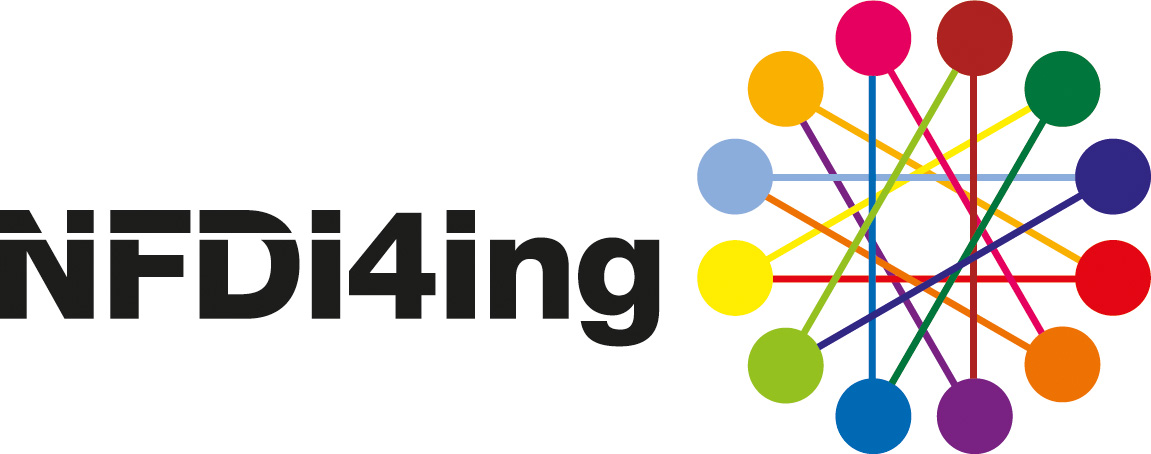
Data Ingest Service
The NFDI4ING Data Ingest Service (https://ingest.nfdi4ing.de) uses OpenID connect for authentication and authorisation. Currently it is using a custom keycloak installation for DFN federation or ORCID login. We would like to connect it to the NFDI AAI.
Goals
- The Data Ingest Service originally was designed to target architecture and civil engineering, but we will breaden the scope in the future.
-
Results & Deliverables
https://gitlab.ulb.tu-darmstadt.de
Ownership & Utilisation
MIT Licence

Chaldene: Accessible High-Performance Computing for Image Processing
Currently, Chaldene is not optimised for computationally intensive AI workflows. This limitation hinders its application for cutting-edge, AI-driven research within the NFDI community.
To address this gap, we are working on connecting Chaldene to High-Performance Computing (HPC) infrastructures using containerised workflow execution. This approach requires a robust trust and identity framework, making the integration with the NFDI Authentication and Authorisation Infrastructure (AAI) essential for two primary functions:
Secure HPC Access: The NFDI AAI is required to provide researchers with seamless and secure authenticated access to remote HPC resources. It will allow Chaldene to act on a user’s behalf, submitting containerised jobs to clusters by leveraging the user’s trusted home institution identity, thus eliminating the need for separate credentials.
FAIR Workflow Sharing: To make Chaldene workflows truly shareable and reproducible according to FAIR principles, the NFDI AAI is necessary. It ensures that when a workflow is shared, a collaborator can execute it using their own verified identity, accessing the required data and compute resources they are authorized for, regardless of their institution.
Goals
Demonstrate NFDI AAI value for:
- accessing remote computational resources
- enabling FAIR workflow sharing
-
Results & Deliverables
https://github.com/c3di/chaldene
Ownership & Utilisation
MIT or LGPL
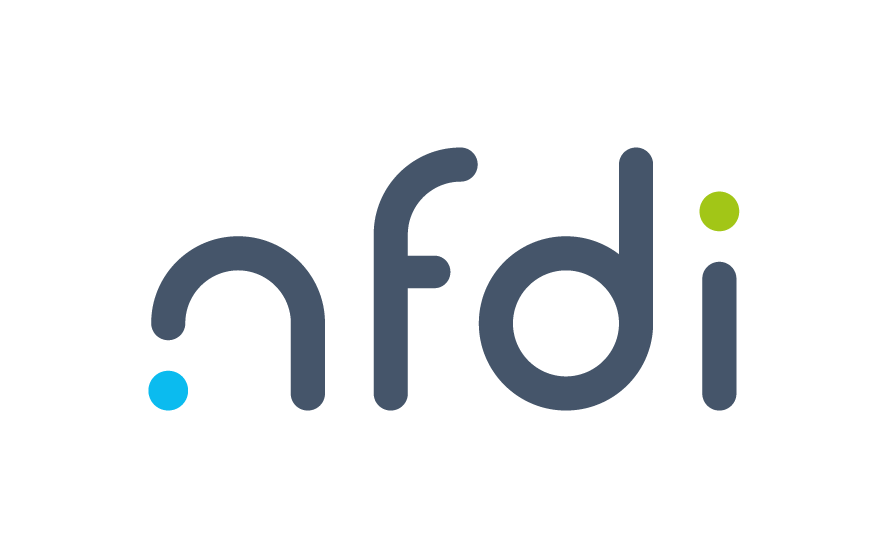
Single Sign-On for NFDI internal ICT tools
The NFDI Association’s Office provides ICT tools that support all persons working for NFDI. Single sign on will be implemented for these NFDI internal ICT tools to increase the efficiency of on- and offboarding and improve the overall IT-security within NFDI.
The office of the NFDI association provides several ICT tools that support work in NFDI. These include:
- Rocket.Chat: Real-time messaging 1.600 User
- OpenProject: Project Management 850 User
- NocoDB: Database Platform (currently in soft launch)
- Cloud Storage Service: file sharing, collaborative document editing, group calendar
These services are self-hosted on premise. So far, only the internal authentication of these services is used. Accounts are created by appointed consortia admins for their respective consortium members or by the IT-Support team of the NFDI Office. Connect (OIDC) and Shibboleth.
Goals - Streamline onboarding new employees, as only one central account per person needs to be set up - Allow reliable and efficient offboarding of persons leaving NFDI - Strengthen IT security - Improve monitoring of usage of the tools
Activity page-
Results & Deliverables
Not applicable
Ownership & Utilisation
-

Best practice AAI for BERD Data Portal
This incubator project focuses on applying IAM4NFDI standards within the BERD@NFDI infrastructure. We aim to adopt best practices and reference implementations (e.g., OpenID Connect, entitlement-based access) to future-proof our platform for federated, cross-consortia workflows. The project will help ensure compatibility with external services such as Galaxy, and position BERD for participation in the EOSC federated system.
Goals
- Implement OpenID Connect as the SSO protocol following IAM4NFDI recommendations.
- Apply attribute exchange mechanisms for user entitlements and roles.
- Enable future compatibility with federated identity and EOSC guidelines.
- Validate use cases with external services (e.g., Galaxy) that rely on IAM-compliant standards.
-
Results & Deliverables
Not yet published
Ownership & Utilisation
CC By 4.0
GFBio Single-Sign-On for NFDI4Biodiversity
Wir wollen die GFBio Single-Sign-On Lösung evaluieren, ob sie als Login für die Dienste der NFDI4Biodversity geeignet ist. Außerdem soll die Kompatibilität mit dem Lifescience AAI Login geprüft und sichergestellt werden.
Die GFBio Single-Sign-On Lösung ist ein dedizierter Dienst, der von der GWDG betrieben wird, um die Authentifizierung für die Dienstbetreiber des GFBio e.V. (Geschäftsstelle und Mitglieder) bereitzustellen. Der Dienst basiert auf der AcademicID, die eine der Community AAIs im IAM4NFDI ist. Das GFBio Single-Sign-On kann derzeit föderierte Anmeldungen aus der DFN-AAI und der LifescienceAAI ermöglichen und bietet darüber hinaus die Möglichkeit, dass sich jeder Nutzer selbst einen GFBio Account registrieren kann. Im Rahmen dieses Inkubators soll untersucht werden, inwieweit die GFBio Single-Sign-On Lösung für alle Bedürfnisse der NFDI4Biodiversity genutzt werden kann. Eine große Frage ist unter anderem die Autorisierung und Gruppenverwaltung in den GFBio Diensten und vor allem das Zusammenspiel mit der LifescienceAAI-Login und einem dedizierten GFBio Account, der auf der Academic Cloud basiert.
Goals
- Das Ziel dieses Inkubators ist es, eine klare Aussage zu machen, wie wir mit dem GFBio Single-Sign- On die Autorisierung und das Gruppenmanagement in den GFBio-Diensten weiter nutzen können und auch Nutzer/innen einbeziehen, die sich über die LifescienceAAI registriert haben.
-
Results & Deliverables
https://kb.gfbio.org/
Ownership & Utilisation
permissive open-source + CC0 / CC-BY

Opening up the SimpleVM Bielefeld University Installation for external collaborations
Easy access to computational resources for challenging bioinformatics analyses is often difficult for researchers to obtain. SimpleVM (https://simplevm.github.io) is hosted in the de.NBI Cloud, which provides compute and storage resources for several NFDI consortia and services such as Jupyter4NFDI and TS4NFDI. SimpleVM provides VMs with browser-based virtual research environments for data-processing, development use-cases, cluster-based computing, GPU-accelerated cases, and workshop scenarios. SimpleVM is also used as a teaching application at Bielefeld University as part of the Data Science Infrastructure (DSI) initiative, integrated with the local Shibboleth IdP.
The purpose of this incubator project is to allow external researchers to use the SimpleVM DSI installation and participate in teaching courses and projects. If successful, NFDI AAI will be used for de.NBI Cloud SimpleVM as well.
Goals
- The SimpleVM DSI platform should be accessible to non-Bielefeld University members to enable the collaboration between members of different educational and research institutions, including NFDI consortia.
- User login/registration into SimpleVM DSI via the NFDI Infra Proxy.
- Minimal required attributes (User ID, User Name, e-Mail) are transferred to SimpleVM DSI Keycloak.
- Access access to the SimpleVM dashboard and project resources for members.
-
Results & Deliverables
https://github.com/deNBI
Ownership & Utilisation
MISSING, in preparation to select a suitable OpenSource license

Opening the Cloud-based Workflow Manager (CloWM) to the whole NFDI
In the context of NFDI4Microbita we develop with the Cloud-based Workflow Manager (CloWM) an integrated platform for highly scalable workflow execution. CloWM allows the seamless integration of (1) versioned workflows, (2) robust data storage, (3) a highly scalable compute layer and (4) a user- friendly interface. Due to its generic design the platform is also used in other NFDIs (e.g. NFDI4Biodiversity) as an execution environment for community specific data analysis workflows and will be an official de.NBI service soon. With this Incubator project we want to open our service to a broader community by supporting the usage of other community AAIs for authentication.
The CloWM platform currently supports LS LOGIN (Life Science Login) via OIDC as SSO solution for user authentication. If the NFDI Infra Proxy supports OIDC, we will add it as an additional login option and hence opening the platform to users of other community AAIs.
Goals
The CloWM platform should provide the NFDI Infra Proxy as login/registration option to users from other consortia where LS LOGIN is not so widely used as in the life sciences. This will open the platform to a broader community.
We expect that the results of this incubator will further open the CloWM platform to the whole NFDI community. Since CloWM is completely open source (Apache 2.0 license), the implemented login provider using the NFDI Infra Proxy might also be used as an open, blueprint implementation for other web-based services in the future.
-
Results & Deliverables
See: https://gitlab.ub.uni-bielefeld.de/cmg/clowm
Ownership & Utilisation
Apache v2.0
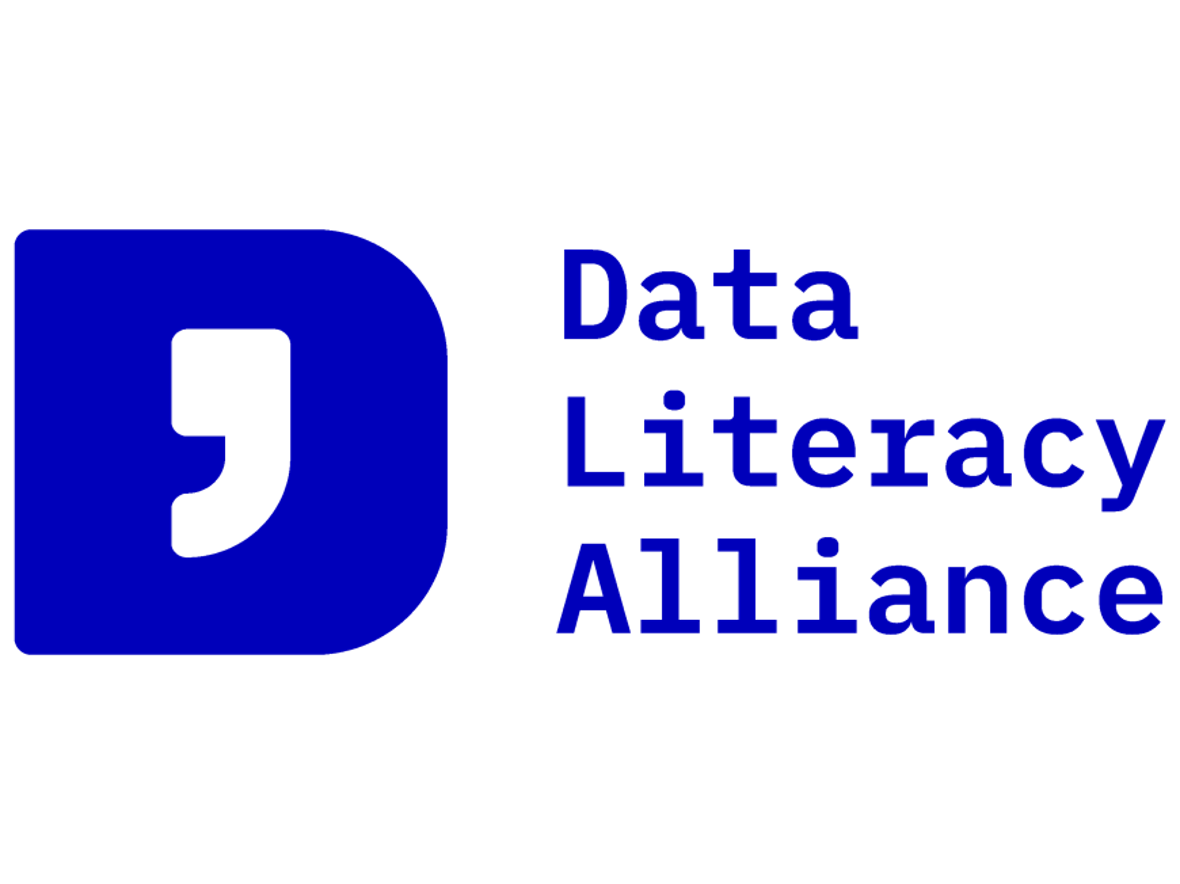
NFDI AAI for DALIA
DALIA is a search platform for teaching and learning resources on RDM and data literacy. Its intended purpose is to offer a single point of entry to search and access open educational resources (OER) published by NFDI’s consortia and sections and by third parties.
The integration of the DALIA platform with IAM4NFDI will strengthen the connection to the NFDI and RDM communities and will offer a seamless authentication flow for DALIA’s users.
The DALIA platform consists of a Django-based backend application server and a frontend web application based on the Next.js framework. The authentication library we plan to use in DALIA’s backend is django-allauth which supports various social authentication flows and protocols, in particular a general OIDC provider. The library’s new headless feature (https://docs.allauth.org/en/latest/headless/index.html) will be used to provide a REST-based authentication flow for DALIA’s frontend. Additionally, we envision to process attributes from IAM4NFDI’s Core Attribute Profile to populate our users’ profiles.
We can reuse findings and solutions by other projects and IAM4NFDI incubators on the integration of NFDI AAI into Python web projects:
Goals
- Addition of an NFDI AAI login to DALIA’s search portal by integration of the NFDI Infrastructure Proxy as an OIDC provider.
- Users can login at the DALIA search portal via the NFDI AAI, in particular by using their Home-IdP.
- Become an overarching NFDI base service, thus it should connect to the NFDI AAI infrastructure via the Infrastructure Proxy.
-
Results & Deliverables
https://git.rwth-aachen.de/dalia/backend/django
Ownership & Utilisation
MIT License

Integration: Aruna Data Orchestration Engine with Infrastructure Proxy
As part of the incubator project, the Aruna Data Orchestration Engine is to enable authentication against the Infrastructure Proxy Infrastructure Service of IAM4NFDI. This allows easy access to all community AAIs involved in IAM4NFDI without having to integrate each AAI individually.
We want to support authentication via the Infrastructure Proxy Infrastructure Service in our Aruna Data Orchestration service. The service is developed inside the NFDI4Microbiota and NFDI4Biodiversity consortia. Currently, we support Life Science Login and GFBio SSO (via OIDC). If the IAM4NFDI Infrastructure Proxy Infrastructure Service supports OIDC, adding it as a login option should be straight forward. Our Aruna Data Orchestration service already supports multiple OIDC identity provider for individual users.
Goal:
- Enabling the user authentication via the Infrastructure Proxy Infrastructure Service provided by
-
Results & Deliverables
See https://github.com/arunaengine
Ownership & Utilisation
Apache V2.0
MIT License
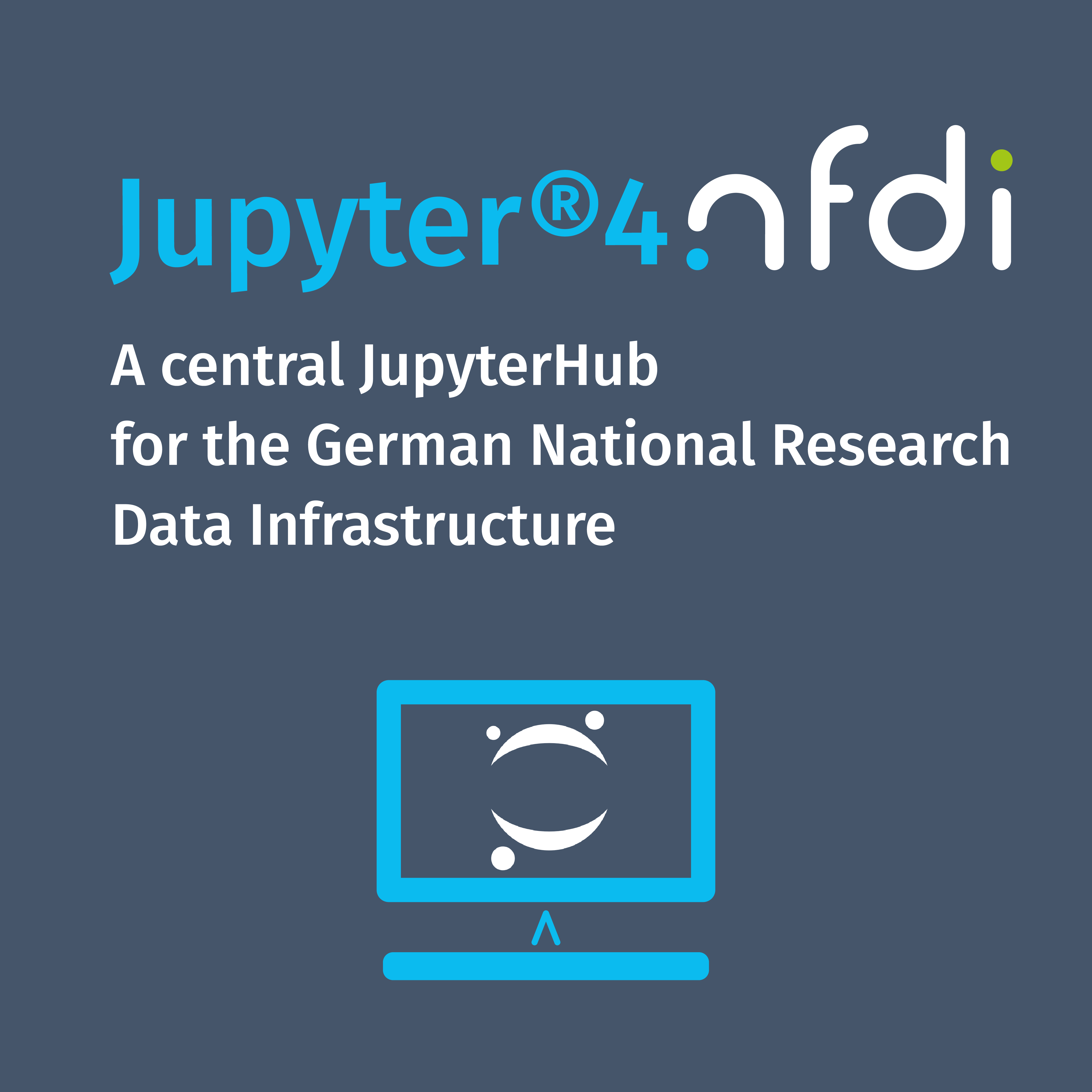
Jupyter4NFDI accessible for NFDI and beyond
Jupyter4NFDI aims to address the fragmented deployment of Jupyter Notebooks across NFDI consortia by offering a centralised service.
Jupyter4NFDI project is a central service that integrates resources from participating institutions and enables users to run Jupyter notebooks on infrastructure (Jupyterhubs)
The incubator provides the framework for preparing and eventually realising the integration with the NFDI Infra Proxy, which will effectively make the service accessible to all community AAIs.
The aim of this incubator cycle is the integration of the Jupyter4NFDI hub with the NFDI Infra Proxy and with the community AAIs. While the central hub of Jupyter4NFDI already is in place and accessible via the Helmholtz AAI – one of the IAM4NFDI community AAIs –, the aim is to provide wider access to it by integrating the proxy as soon as this becomes available.
At a technical level, the communication required to delegate work to the Jupyterhubs available is realized by Jupyterhub Outpost, a Python software created specifically for the use case of this project. At a conceptual level, the work will consist in translating the AAI concepts in appropriate options for the service, in formulating requirements of the service for the AAI, in helping to harmonize the options of the central service and the existing Jupyterhubs and their AAIs.
Goals
- Simplify access, improve user experience, and extend Jupyter’s reach to a wider audience within and beyond the NFDI.
- Extend the reach of Jupyter4NFDI so that it is usable by all community AAIs which are part of IAM4NFDI, so basically the use across all NFDI consortia is intended.
-
Results & Deliverables
https://nfdi-jupyter.de
Ownership & Utilisation

BIIGLE
We want to support authentication via the NFDI Infra Proxy in our BIIGLE service for image and video annotation (biigle.de). The service is part of the NFDI4Biodiversity service catalogue and also participates as a pilot project in NFDI4Earth.
BIIGLE should provide the NFDI Infra Proxy as a login/registration option so users from different consortia (currently NFDI4Biodiversity and NFDI4Earth) can easily use the service.
Activity page-
Results & Deliverables
https://github.com/biigle
Ownership & Utilisation
GPLv3.0

WissKI
For the Scientific Communication Infrastructure (WissKI), the joint initiative of the Data Competence Centre SODa is planning to set up a didmos Community AAI Single Sign-On (SSO) system from DAASI as part of the IAM4NFDI incubator fund. WissKI-based services such as the WissKI Cloud and the Semantic Coworking Space (SCS) as well as the entire NFDI network will also benefit from this.
With the aim of creating a robust, compatible authentication and authorisation infrastructure (CAAI) for the WissKI-based infrastructure offerings, the open source didmos solution was selected due to its compatibility with dockerisation and its proximity to the GLAM and DH communities, in particular NFDI4Culture, NFDI4Objects and NFDI4Memory, and comprises the following work steps:
- Setting up a client in the central didmos instance
- Configuration of the NFDI AAI federation
- Configuration of the WissKI instances as clients
-
Results & Deliverables
Missing!!
Ownership & Utilisation
Missing!!
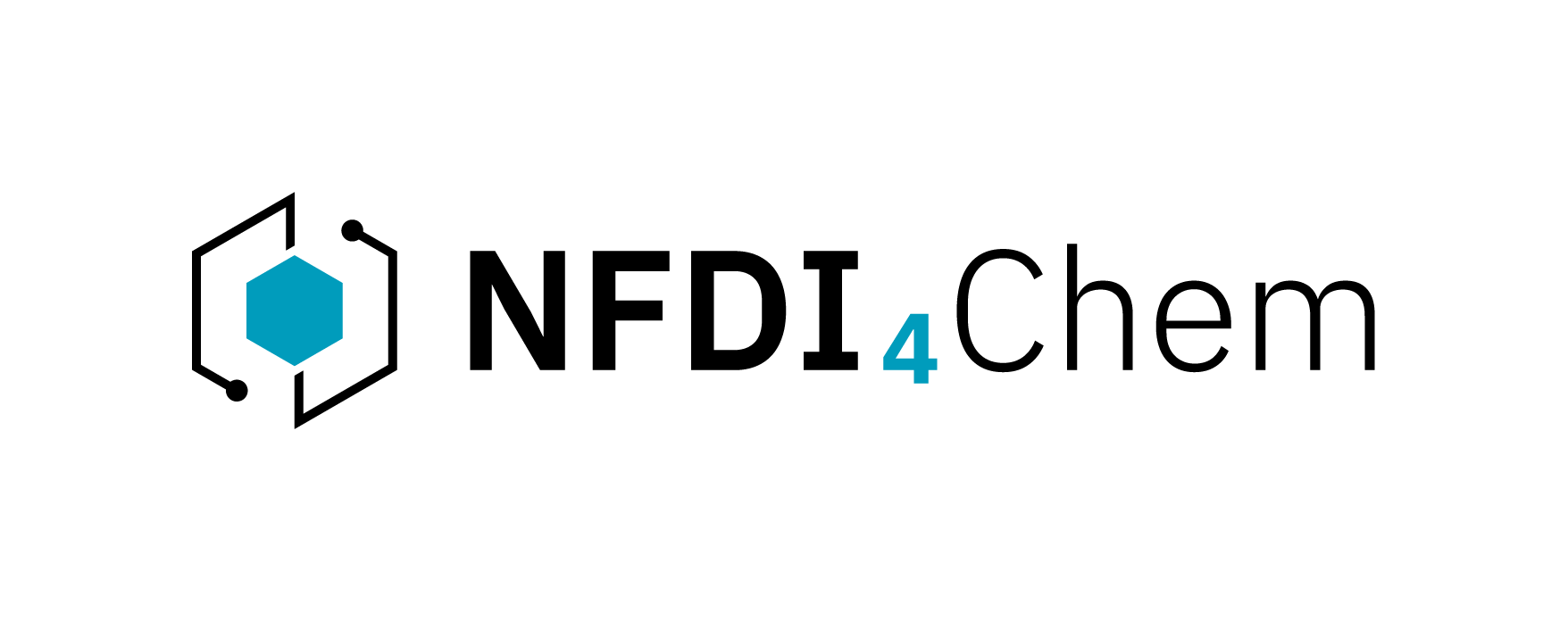
Terminology Services2.0
While our initial incubator proposal focused solely on the Terminology Service (TS), we soon realised that its requirements did not encompass the full spectrum of services within the NFDI4Chem consortium. Consequently, we expanded our approach to include the major services of NFDI4Chem in the Community AAI. Currently, in addition to the Terminology Service (TS), we are testing the Community AAI with Chemotion Repository, nmrXiv and COCONUT. We plan to integrate more services with the Community AAI in the future.
Goals
Our primary objective is to establish a unified AAI solution within a single consortium, enabling users to seamlessly access and utilise all available resources. In the second phase of the incubator project, we aim to integrate test instances of various services with the chosen CAAI. This will help us gather requirements that might necessitate modifications on both services and CAAI.
This will help us ensure that we meet our requirements of the majority of these services.
- Support different logins both institutional and non-institutional. (Flexibility of customising the list)
- Multiple account creation and linking
- REST API with authentication code, so as to ease the maintenance of a service (for example during account deprovisioning, or movement of staff within the department)
- Improve flexibility of creating LDAP servers (internal and external) and communication with its OIDC instance.
- Facilitate both GUI and non-GUI based logins [optional]
-
Results & Deliverables
.
Ownership & Utilisation
.

Open Energy Platform
With this incubator process, we (NFDI4Energy) want to commit to a specific CAAI solution, namely Reg-APP, and integrate it on the OpenEnergyPlatform (OEP). NFDI4Energy is committed in reusing already existing solutions and platforms. As a result, the OEP will serve as one of the main bases for further developments in Research Data Management in the Energy domain and will be a linking and collection point for further NFDI4Energy services.
The OEP currently consists of a simple local login (E-Mail and Password) based on basic services available through the python package Django with a PostgreSQL database and simple fronted technology (HTML, JavaScript, CSS). To add Reg-APP support we plan to use the django-allauth module, which supports SAML as well as OpenID Connect.
Goals
- Integrate RegAPP on the OpenEnergyPlatform as the primary Authentication Service.
- Transfer or map existing user accounts, since we plan to maintain the legacy login as well as the RegAPP login.
- Operate the OEP and associated services under real environment conditions. As the OEP is a community service we think that a connection to the NFDI Infra proxy will not be necessary.
- The served user base will be a mix of researchers, industry partners and society. As such an authentication method that is not based on the research infrastructure needs to be supported, as well.
-
Results & Deliverables
https://github.com/orgs/OpenEnergyPlatform/projects/40
Ownership & Utilisation
AGPL-3.0-or-later https://github.com/OpenEnergyPlatform/oeplatform/tree/master?tab=License-1-ov-file

NOMAD Integration
We want to link NOMAD to the NFDI AAI. NOMAD is a web-based research data management (RDM) platform for material science. It integrates a data repository, Electronic Lab Notebook (ELN), and JupyterHub into a unified platform. It is the main service developed and offered by the FAIRmat consortium.
NOMAD uses Keycloak as a Single Sign-On (SSO) solution. We operate a single central instance that is used by all NOMAD installations and services. Currently, we only allow users to use NOMAD accounts that were created on this Keycloak instance. NOMAD uses Keycloak primarily for authentication since all rights are managed within the NOMAD application. Therefore, we currently do not see any need for (community) roles, attributes, or similar functionality within NFDI AAI.
Technically, we want to realise this integration either via OpenID connect or SAML depending on NFDI AAI capabilities. Since, NFDI AAI and Keycloak already support at least one shared protocol, the integration should be straight forward. Most of the work, will probably be dedicated to test the integration. We might need some assistance in configuring the connection via OIDC or SAML.
Goals
- Integrate the NFDI AAI as an identity provider for NOMADs central Keycloak instance. This should allow users to login with their existing NFDI AAI identities. A large portion of the ~4000 existing NOMAD users are affiliated with research institutes and Universities in Germany and Europe. Therefore, many of the existing users and potential new users might already hold identities within the 4 proposed NFDI AAI solutions.
- Simplify future integrations with other (NFDI) services (within the materials science community and beyond). For this it is necessary that services rely on a shared NFDI AAI solutions.
- Evaluate the use of linking different identities belonging to the same individual user.
-
Results & Deliverables
.
Ownership & Utilisation
.
NFDI4CAT Repository
The NFDI4CAT community requires a central solution for the storage and exchange of experimental and simulation data to streamline research activities and support collaboration. To address this need, NFDI4CAT propose the deployment of a central repository using Dataverse. This repository will facilitate organisation, sharing, and archiving of research data within the community, ensuring efficient data management and accessibility. We would like to explore the possibility to use the NFDI Authentication and Authorisation Infrastructure Framework for the NFDI4Cat Dataverse repository. This will enable our repository users with seamless and secure access to their data.
Goals
- Incorporate the concepts of community and infrastructure proxy.
- Integrate NFDI AAI single sign-on for Dataverse for the NFDI4CAT community.
- Include all stakeholders (University, Non-University).
- Address any issues identified during testing to ensure a smooth and reliable user experience.
-
Results & Deliverables
.
Ownership & Utilisation
.

File Transfer Service FTS
The File Transfer Service (FTS) is a Software that is developed by CERN and that specializes in easy, large scale data transfer. It allows the scheduling of transfers and results in a good utilization of the available bandwidth. We are currently setting up an FTS instance to enable users to transfer their research data between different endpoints, our research data management system, and the cluster.
Goals
As a result of the project, it should be possible to login through our community AAI solution at the FTS web-interface. This removes the need for client certificates. When granted permission to access FTS this way, an FTS user should automatically be created with basic transfer permissions. Users should also be able to view the Web Monitoring to see the status of their transfers, while administrators should be able to view the status of the overall service. Participants of this incubator are the project team members that implements this project. The communities that require a solution are researchers from different NFDI consortia that will use the FTS instance of the RWTH Aachen University to transfer their research data quickly and reliably.
- The RegApp is connected to the FTS server instance of the RWTH Aachen University.
- Generation of new FTS users is prompted by first-time access through the RegApp.
- The Web Monitoring platform of the FTS instance, which is separate from the server, is connected to the RegApp.
-
Results & Deliverables
.
Ownership & Utilisation
.

Forum 4 MICA
The idea of the incubator proposal is to use the Forum4MICA as a pilot project to connect the consortium KonsortSWD to Community AAI.
Forum4MICA is a publicly accessible exchange and information platform on topics related to the data collections of the participating Research Data Centers (RDC). The online forum gives RDCs (currently 18) an additional option for communicating with their data users and interested persons. It enables the provision of specifically requested information on the research data provided.
As submissions and interactions are only possible for registered users, logins via NFDI-AAI would substantially improve the user experience and reduce effort.
Goals
Find out if an implementation of an IAM system in the consortia is possible and act as a demonstrator within KonsortSWD.
Connect the existing community service Forum4MICA to NFDI AAI.
Identify which possibilities exist to connect the service
Evaluate the transferability of the IAM results in this incubator to additional services. E.g. institutional repositories (e.g. at GESIS) require registration but have so far not expressed interest in joining IAM4NFDI For these providers this incubator would be a demonstration of the service’s capabilities.
-
Results & Deliverables
.
Ownership & Utilisation
.

FairAgro
FAIRagro is the NFDI consortium focussing on agrosystems research. FAIRagro will offer various services, such as a Nextcloud system, a Zammad-based helpdesk system, and the FAIRagro Search Portal. These services will be integrated with an Authentication and Authorisation Infrastructure (AAI) based on NFDI recommendations to facilitate usage.
Further services will be connected to the CAAI, including consortium-internal services and community services.
Goals
Link the existing FAIRagro services to the CAAI and develop a group and role concept to enable authorisation of different user groups. The integration process will involve the definition of groups and roles with regard to the consortium
Activity page-
Results & Deliverables
.
Ownership & Utilisation
.
DataPlant
The DataPLANT consortium develops and provides a wide range of services to support FAIR data science in plant biology. In the past, we have implemented our own IAM infrastructure but as our collaborations with other consortia and institutions continue to grow, we are in need of a broader IAM integration.
Our infrastructure needs to be connected to the larger IAM4NFDI system to allow users from both DataPLANT and other consortia to use our services. The DataPLANT user base needs to be integrated as a community identity provider. Authorisation decisions within the services should be derived from user attributes provided by the respective consortia identity providers.
Goals
Integrate our identity provider with the IAM4NFDI system to allow DataPLANT users to easily connect to other NFDI services.
Connect the IAM4NFDI infrastructure to our services to allow users from other consortia to use our services.
Management of user attributes, their propagation across the service landscape and how we can use them to implement fine-grained authorisation policies based on entitlements, user affiliation and role, among other things.
-
Results & Deliverables
.
Ownership & Utilisation
.
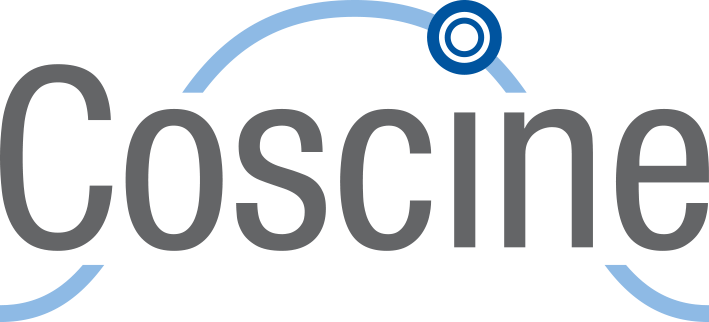
Coscine-2
Coscine is an open-source platform for research data management (RDM) and can be used by all researchers of every field. In context of the FAIR-principles the login to Coscine is already possible with an institutional account (Single Sign-On) or using ORCID.
One aim of this incubator proposal is the extended support of social login possibilities within our CAAI (RegApp). Furthermore, we would strive for the connection of accounts inside RegApp (e.g., ORCID with Single Sign-On). This would simplify the usage of Coscine because now the user needs to manually connect the accounts within the platform itself. As a further point of the anticipated work, we would see the supply of intersections for delivering of information by the home organisation as well as by the AAI. This would improve the transfer of roles which is needed because in Coscine different functionalities are linked to specific roles.
Goals
- Enabling intersections in a decentralized way to get information from the Home Organisation as well as from the AAI Login about the roles which are given in Coscine.
- Analysing in which context the definition of roles in the framework of NFDI and Coscine makes sense and in how far they need to be implemented (e.g. as Reviewer for Application Profiles).
-
Results & Deliverables
.
Ownership & Utilisation
.

Come2Data
Come2Data aims to close a currently existing gap in support regarding a large range of data issues, such as:
- Data problems during any stage of the data life cycle (e.g. acquisition, management, analyses and publication)
- Trainings to acquire data competencies.
To address these issues, we operate a help desk (level 1 support) and provide educational resources, such as certified trainings (after completion of the current funding period for establishing the centre). For very specific data problems, we have a database of specialists in the respective fields who will gain access to Come2Data resources once they serve as data experts for our helpdesk (level 2 support).
In order to run the centre, we plan to implement a systematic technical infrastructure, containing a WordPress CMS-based website, a triple-store knowledge base, and storage space for large data
We seek support for an AAI solution that integrates the institution-specific IDM solutions to grant selective access on various levels (see above). We furthermore look for a solution to work with users with educational or scientific institutional login as well as without such a login possibility.
Goals
We aim for a broadly available authorisation process to gain access to our services that implements the use of existing AAI-solutions.
For users who are not affiliated with any community providing an AAI-service, an alternative solution is required, e.g. to register for our trainings and gain access to course material. The overarching goal is to make our services available to a broad range of users from both academic and non-academic (e.g. industrial, general public) backgrounds.
Activity page-
Results & Deliverables
missing
Ownership & Utilisation
missing

NFDIxCS
The current startup phase of NFDIxCS is characterized to hammer out the detailed requirements for the NFDIxCS platform. A key of both areas – the platform and the RDMCs – need a profound, flexible and extensible way to use and manage identities, authentication and authorization methods for accessing the plarform and the RDMCs managed within the platform.
The goal of the incubator is threfore to explore the field of identity management methods and technologies which are available and in wide use in the community – primarily in the field of platforms for management and publication of research data in Computer Science but also in related scientific areas beyond CS. The result of this will be a list of related methods and architectural requirements to use the methods in the NFDIxCS systems that are implemented in the future.
Activity page-
Results & Deliverables
No content provided.
Ownership & Utilisation
No content provided.
Authorisation on Objects
Repositories in general need certain authentication and authorization functionalities for controlling import and export of data. It would be desirable, that an NFDI-wide IAM solution supports such AAI functions, as they are required by potentially all research data repositories across all disciplines.
We acceppt this challenge and use the TextGrid and DARIAH-DE Repositories as examples to implement such AAI functions, if as extension, integration or even overall management shall be subject to decision of the IAM4NFDI group.
Activity page-
Results & Deliverables
Die Resultate werden momentan als Minutes der (ungefähr) monatlichen Treffen und Videokonferenzen festgehalten, samt Aufgaben und weiterem Vorgehen. Die technischen und inhaltlichen Erörterungen zwischen den Partnern GWDG, DAASI, und SUB sind fortgeschritten.
Die verwendeten Technologien und Dienste werden am Beispiel von TextGrid und DARIAH-DE Repository sowie einer für NFDI-weiten generischen Lösung evaluiert und angedacht. Sobald die Evaluation und Planung angeschlossen ist, ist eine gemeinsame Implementierung der jeweiligen Prototypen angedacht.
Ownership & Utilisation
möglicherweise EUPL-1.2

Integration of NFDI AAI to Open edX
This Incubator Project focuses on integrating the NFDI Authentication and Authorisation Infrastructure (AAI) with Open edX. The primary goals are to gain an initial understanding of IAM4NFDI, test the usability and features of available Community AAIs, and determine the best Community AAI to use.
Three major steps
Authentication Process
- Applied for OAuth-Client with three Community AAIs (Unity, RegApp, AcademicID), created a Flask app for testing authentication methods.
- Integrated three Community AAIs into Open edX using Python Social Auth, with reusable Python classes for third-party authentication.
Virtual Organisations
Applied for admin accounts, tested UI handling, and examined the impact on authentication attributes.
Decision on CAAI
Compared three AAIs using a rating matrix, recommended one within the consortium, verified by an internal group, and finalised by the steering group.
Activity page-
Results & Deliverables
- Open edX login page: https://apps.edutrain.nfdi4earth.de/authn/login?next=%2F
- Adaption of python package Social Core of the Python Social Auth available here
Ownership & Utilisation
Python package - Licence: Apache v2.0
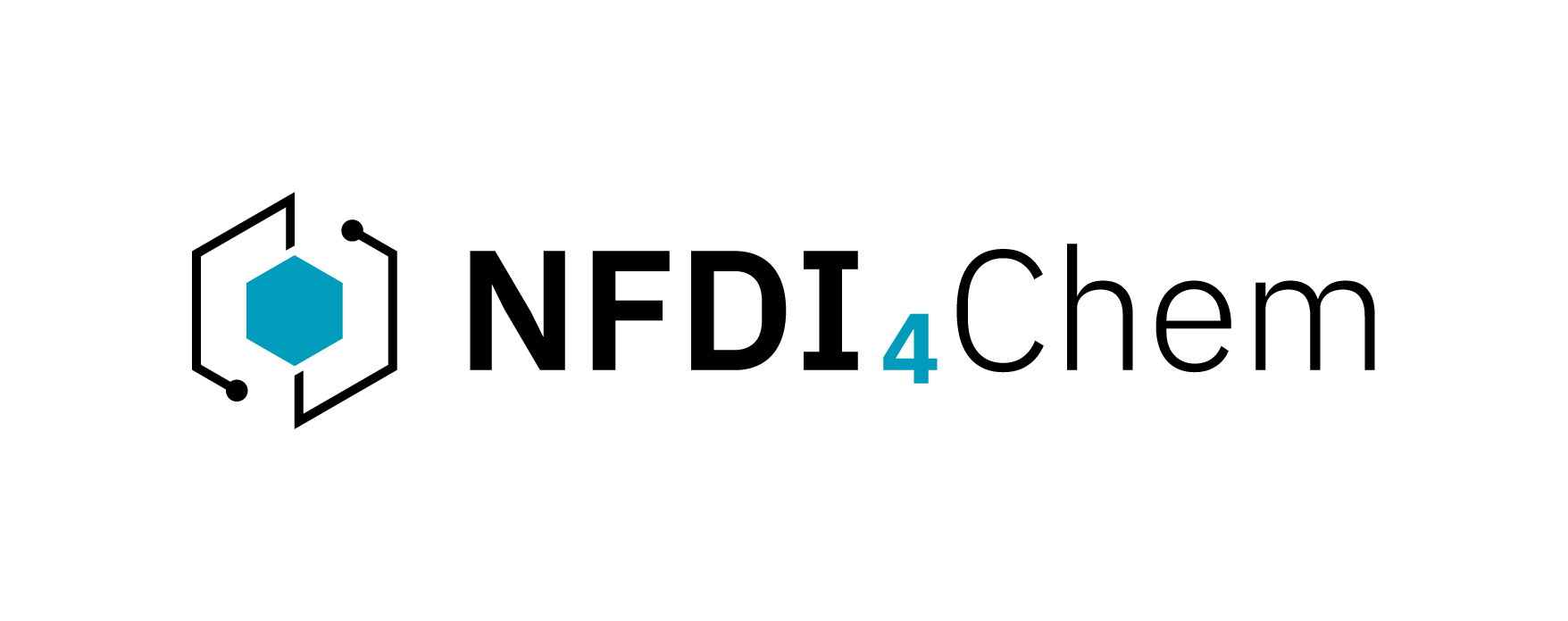
Terminology Service
The goal of NFDI4Chem is to have a unified AAI solution within a single consortium, enabling users to seamlessly access and utilize all available resources. From the incubator project, we aim to integrate test instances of various services with the chosen CAAI. This will help us gather requirements that might necessitate modifications on both the services and the CAAI front, ensuring that the needs of the majority of these services are met. Following comprehensive testing across all facets, the test instances of each service will transition into production. The list of services to be connected with CAAI includes the Terminology Service (TS), Chemotion Repository, nmrXiv, COCONUT and more.
Activity page-
Results & Deliverables
- https://knowledgebase.nfdi4chem.de/knowledge_base/docs/chemotion_repository
- Derivables:
- Implementing the CAAI software across multiple services in the NFDI4Chem consortium.
- Successfully transitioning demo/test instances to production after comprehensive testing across all facets.
Ownership & Utilisation
No content provided.
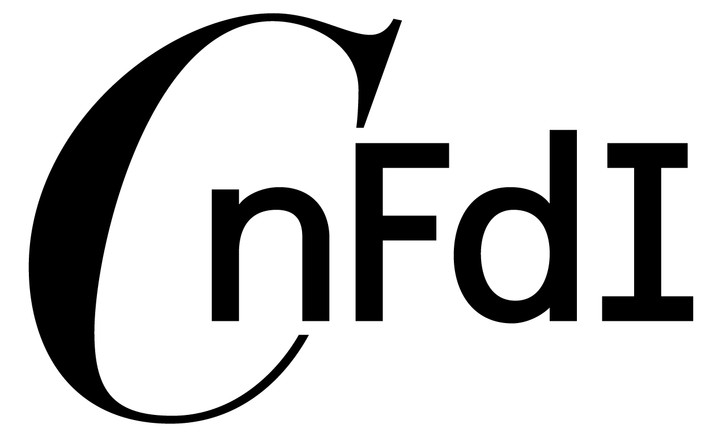
NFDI4Culture
The current NFDI4Culture IAM plays a pivotal role as the central AAI/SSO backbone of the consortium. It accommodates approx. 400 user accounts and seven integrated services, thus contributing significantly to the consortium’s operational efficiency. Due to the implementation of DFN standards, the current IAM already exhibits a high degree of compatibility with the IAM4NFDI set of SAML attributes. The logical next step for NFDI4Culture is the integration of its IAM into the evolving CAAI architecture of IAM4NFDI.
The transition is based on a two-tiered process:
On tier one (not part of the incubator), NFDI4Culture is going to cooperate with DAASI to migrate the existing IAM solution to the IAM4NFDI-compatible CAAI solution didmos.
On tier two (which is the focus of this incubator proposal), the consortium is planning to connect up to three exemplary services from its portfolio to the new IAM4NFDI-compatible CAAI while focusing on the conceptualisation, implementation, and operationalisation of the relevant NFDI policies and the design of a consortium-wide Incident Response Management system. The technical aspects of the integration of the services mentioned above will be done by DAASI in tier one. DAASI will also act as interface between tier one and tier two.
-
Results & Deliverables
- https://doc.nfdi-aai.de/policies/
- https://codebase.helmholtz.cloud/m-team/nfdi/nfdi-policies
Ownership & Utilisation
CC-BY 4.0 https://creativecommons.org/licenses/by/4.0/deed.en
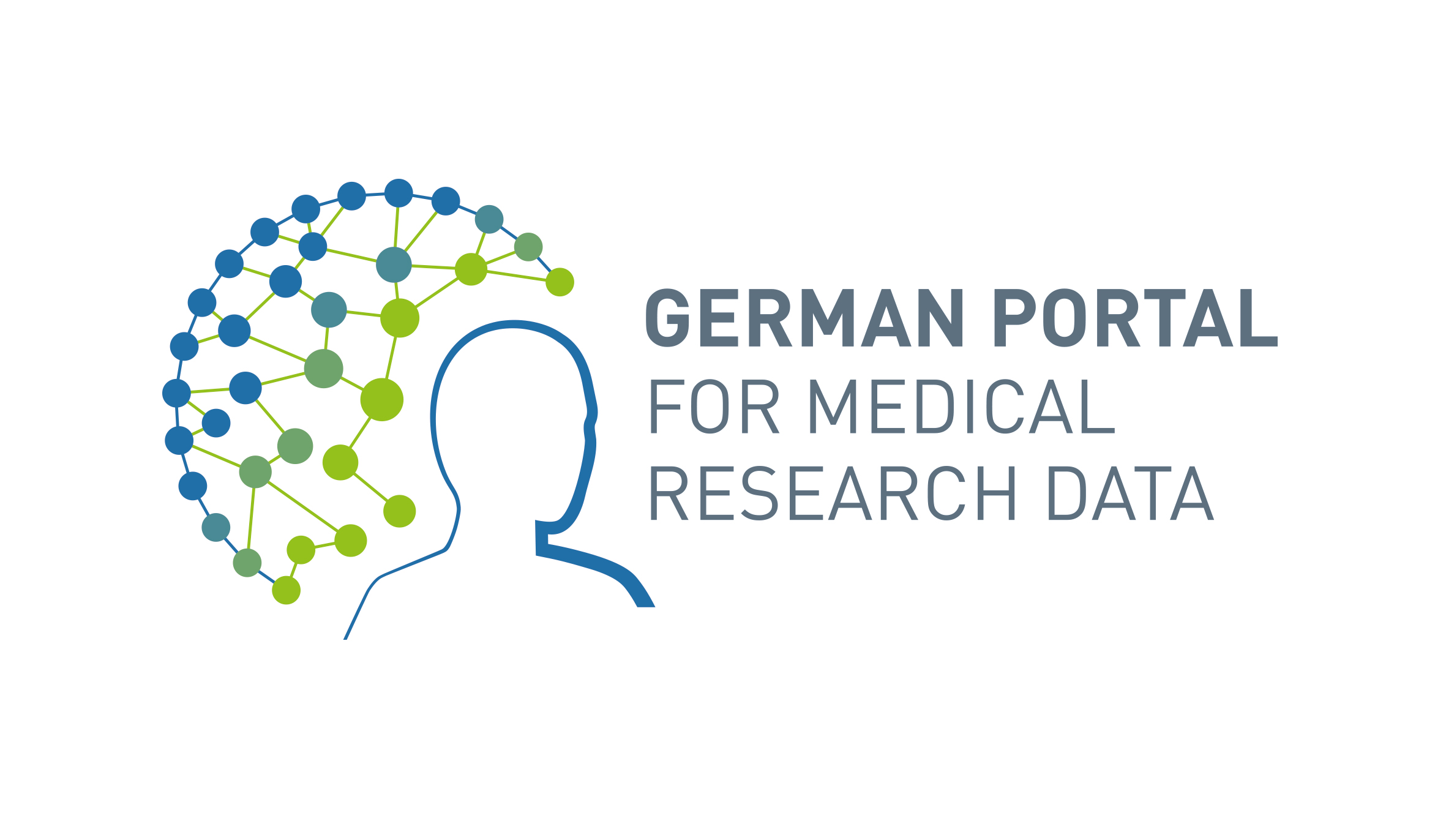
FDPG - Analysing data from clinical care
The German Portal for Medical Research Data (FDPG) is the central point of administration for scientists conducting research projects with routine medical data from German universities.
The Medical Informatics Initiative (MII), which is funded by the Federal Ministry of Education and Research (BMBF), collects patient data and biosamples taken during routine care for medical research and processes them at data integration centres based in university hospitals. The data are then made available in accordance with data protection regulations.
The FDPG offers:
- An overview of databases for cross-centre research the opportunity
- To evaluate the feasibility of specific research questions using
- Feasibility inquiries a standardised process for requesting data and
- Biosamples an established contractual framework for simple data use
- The central coordination of data provision the transparent
- Presentation of research projects in the project registry
-
Results & Deliverables
- Feasibility portal from a cooperation with the FDPGplus project
- https://github.com/medizininformatik-initiative/feasibility-gui (see also feasibility-backend and feasibility-deploy)
- Application portal
- Dashboard for viewing available data from local sites:
Ownership & Utilisation
All source code is available under license: https://github.com/medizininformatik-initiative/fdpg-webapp?tab=Apache-2.0-1-ov-file#readme
- Feasibility portal from a cooperation with the FDPGplus project
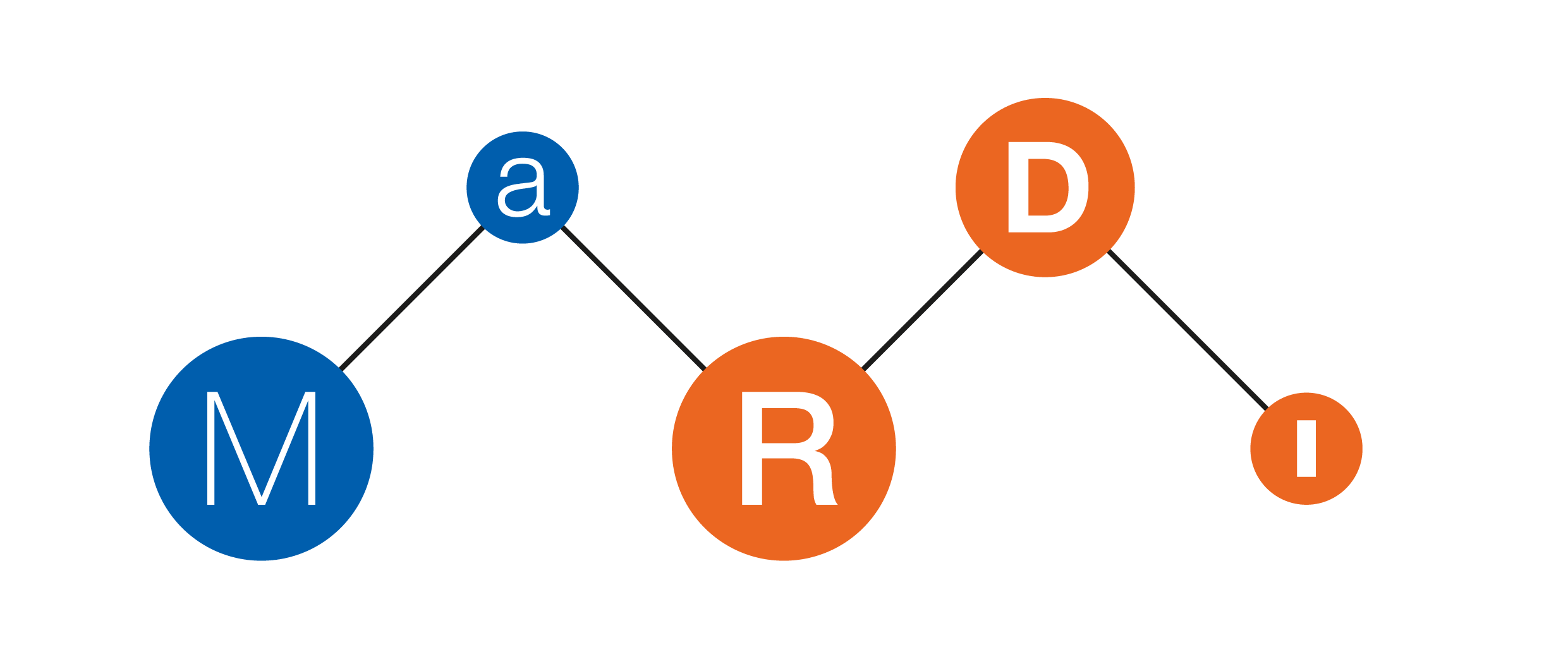
Minimal OIDC login
Numerous web platforms, such as MediaWiki, support the OpenID Connect (OIDC) protocol, allowing users to sign in using their existing accounts. While Google or ORCID accounts were previously used for logging in, this incubator project aims to facilitate logging in using accounts from NFDI institutions with minimal effort for users and administrators while ensuring maximum privacy.
The Germany National Mathematical Research Data Initiative (MaRDI, mardi4nfdi.de) utilizes MediaWiki as its software to establish a comprehensive portal for research data in mathematics and related fields. This platform shares general-purpose technology with the Wikimedia Foundation and extends its functionality to cater to the specific needs of the MaRDI consortium. A fundamental requirement voiced by mathematicians contributing their research data is to avoid the maintenance of additional accounts, making the reuse of their institutional accounts a practical choice. Furthermore, this approach effectively mitigates the risk of spam by disallowing anonymous editing.
Activity page-
Results & Deliverables
Ownership & Utilisation
The incubator will be realized based on the didmos CAA which is licensed Apache 2.0

ArgoCD
IAM4NFDI aims to connect and expand current and new IAM (Identity and Access Management) systems, allowing researchers from various fields and institutions to easily access digital resources in NFDI.
To achieve this goal, IAM4NFDI introduced Incubator Cycles to promote ideas and needs for the NFDI-AAI (Authentication and Authorization Infrastructure).
NFDI4DS successfully proposed such an incubator project. It is using ArgoCD as a prototype for implementing IAM solutions and will be realized at TU Dresden.
The TU Dresden data center has already set up a Kubernetes Cluster for NFDI4DS users. It provides a user-friendly GitOps solution, ArgoCD, to access the cluster. The main users of ArgoCD within NFDI4DataScience are providers of our services, such as repositories and computation services for the data science community.
The goal is to authenticate our ArgoCD users through Single Sign-On with their institutional credentials to
- improve user experience
- increase employee productivity by reducing the time they must spend signing on and dealing with passwords
- achieve better access control
- improve security
Additionally, we’d like to gain a comprehensive experience from connecting ArgoCD to NFDI’s community AAIs. This incubator project will share the lessons learned to leverage the A (Accessibility) and I (Interoperability) in FAIR.
Activity page-
Results & Deliverables
We implemented the CAAI software on ArgoCD in the NFDI4DataScience consortium. Ownership & UtilisationNo content provided.
https://k8scluster.zih.tu-dresden.de/argocd
Ownership & Utilisation
Dont know what that mean - the service is > opensource.

Coscine
Coscine is a platform for research data management. Coscine offers researchers:
- Storage space: access to free storage space (depending on organisational affiliation)
- Integration: Access to project-related data sources (e.g. research data repository, linked files, archived data)
- Collaboration: Access for all project members
- Metadata: Automatically linked to project data
- Individuality: Project-specific metadata can be created as application profiles
- Archiving: Archive research data on site
The metadata for research projects can be shared publicly on Coscine, made searchable and, in the long term, findable at national level. Coscine thus contributes to the goals of the National Research Data Infrastructure NFDI by making valuable scientific and research data accessible to the entire German scientific system.
Activity page-
Results & Deliverables
https://coscine.rwth-aachen.de/login/
Ownership & Utilisation
MIT Licence
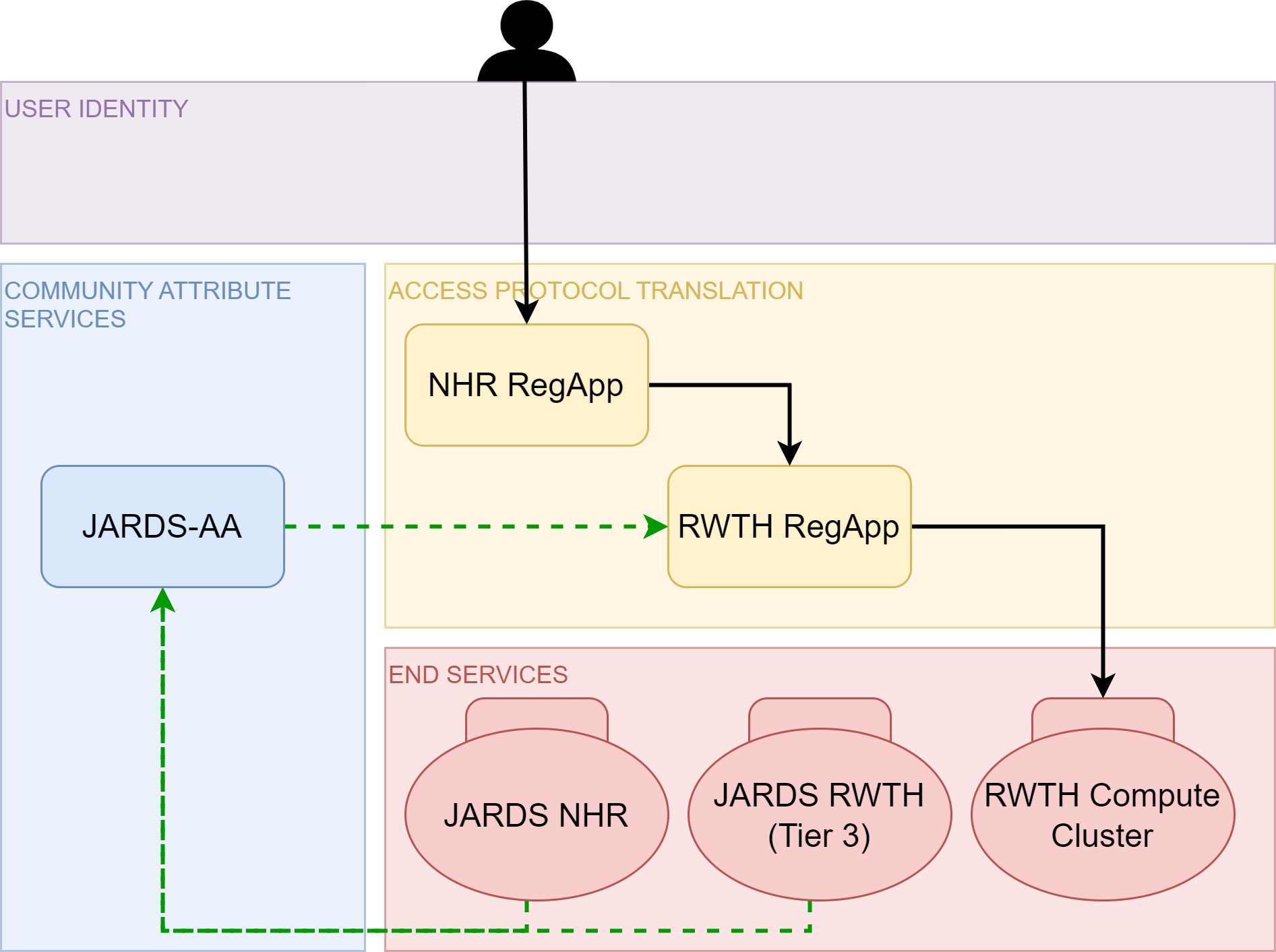
JARDS Attribute Queries in RegApp
At RWTH Aachen University, the JARDS platform is used by researchers to apply for resources such as storage space or computing time. The applications are assessed in a multi-stage scientific review process. After approval, researchers must be given access to the resource and be able to manage other project members. This requires information about approved projects in RegApp. The aim of this project is to enable attribute queries via the SAML protocol in RegApp and to set up a Shibboleth-based attribute authority that returns user data from JARDS. This demonstrates how external applications can be integrated into the Community AAI as attribute authorities.
Activity page-
Results & Deliverables
- Implementation of a generic Docker image that can be used to set up a Shibboleth-based attribute authority
- Provision of an attribute authority for JARDS project data
- Extension of the RegApp to support SAML attribute queries
Ownership & Utilisation
The code for the Docker image for an attribute authority is available under the Apache Licence 2.0. If you are interested, please contact jards-dev@itc.rwth-aachen.de.

MetadataHub
MetadataHub allows access to various metadata stores developed in the NFDI. All operations from "Create" to "Search" can be performed on the metadata stores. There are two demonstrators for this, one showing the interfaces and the other providing a search across all metadata stores.
Activity page-
Results & Deliverables
The following results were created and delivered:
Ownership & Utilisation
MIT License

Pilot project: a prototypical integration of each of the Community AAI solutions for the authentication to the RDMO NFDI4ING service
This a pilot to the IAM4NFDI incubator projects. It will serve as a proof-of-principle for the implementation of the Community AAI (CAAI) solutions into an existing web service. Each of the CAAIs will be integrated in parallel as an OpenID Connect (OIDC) provider to the test instance of the [RDMO NFDI4ING servic] (https://rdmo-test.nfdi4ing.ulb.tu-darmstadt.de/). The RDMO software provides a straightforward way to integrate a wide-range of OIDC providers since it is built upon the Django Web Framework which can leverage the related django-allauth package for this purpose. A simple login via the website will show that the integration with the CAAI was successful.
Activity page-
Results & Deliverables
- successful integration of each of the AcademicID, didmos, RegApp, Unity solutions as an OIDC Provider that allows for authentication into the service.
Ownership & Utilisation
Apache License